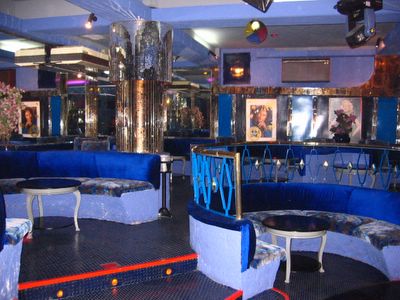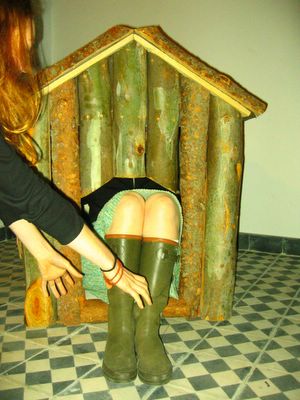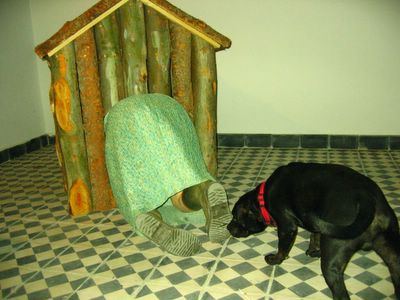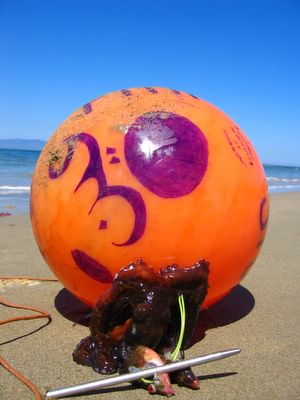Tuesday, May 31, 2005

Strange doors don't really seem to be dividing any space. That's the way it is along the Mexican-Texan Border. That's the way it is between Morocco and Spain. Symbolic doors and borders that are, by all realistic appearances, wide open. And what are these created borders. An exercise in glass-blowing? With a lot of security of course. Don't get me wrong.
The Road to Death, a play on life
A Play “Les Chemins de la Mort” (The road to death) performed by the group: La Groupe du Defil et d’Union (The Group of Disbanding and of Union) has been playing here for a few months. The group is made up of boys from the At-Risk Youth program at the DARNA Boy's Center, a type of orphanage and school. This is a summary and commentary.
As an introductory note, one has to know that everyone in Tangier wants to go to Spain. The director the play said that he tried to convince the kids to write a play on a different subject, but they refused. It's all they want to talk about. They say there is a better life there. More opportunities. People come from all over Africa to this port city thinking that once they've made it here, crossing the Strait of Gibraltar will be easy. If you say you are from Tangier in other places in Africa, people get a dreamy look in their eyes and tell you you are lucky. It is the most used entry point to Europe from Africa and it is only 12.9 km across at it's narrowest point. The artificial border (that is, strict visa requirements) was only put in place in 1991, when Spain finally cracked down on all the illegal immigrants, coming on vacation and staying indefinitely. The borders have become extremely strict lately. Military guard the port, and survey the ocean for Pateras (little fishing boats that take people across at their own risk) and take bribes to let a lucky few pass.
It is everyone's dream to go to the Spain they see on their satellite TVs, that they hear about from brothers, or cousins, or friends who have made it.
The opening scene is a classroom.
First line: “The Devil always comes late”
"The devil" comes in and blames his lateness on love.
He conjugates shoes as a verb. No one can concentrate in class. They have other things on their minds.
A boy comes in from the back of theater, walks down the aisle selling kleenex,
“Dirham, Dirham, Dirham”
He launches into a monologue, strutting across the stage.
“I have sold cigarettes, tic-tacs, cakes, pois chiches (chick peas)”
He huddles down and makes his elbows stick out at unnatural angles, “I have pretended I am crippled, and I have even sold drugs, yes drugs. But there are problems with the police for that and I decided it’s better to sell Kleenex. Everynight I have to give money to my father’s wife, she is an extortionist like all the others in the city, the police etc.”
A friend comes home from making it to Spain. He brags that he has a cellphone. He is dressed in brighter/cleaner clothes, says he has a 4x4 in Spain. Later, when the first boy leaves, he admits to the audience that he has no papers, no freedom, he is working in agriculture, sold carrots, it came to nothing. He wants to come back to Morocco, finds no peace in Spain. He says the fish could eat you on the way over.
Figures :
Many women rent babies for the day to sit with and beg for money. It costs about 50 dirhams to rent a baby for a day, more or less depending on how much profit you make.
Money made by selling loosie cigarettes: 20 dirhams a day
Bread costs 3-4 dirhams
A drink at the cafe you work out of: 5 dirhams.
The kids have to be good actors to be out there everyday. This theater piece is closer to life than to fantasy. It is in fact like an anti-magic show, where the magician shows you how he does all his tricks, which is often even more interesting than seeing the tricks, especially when you know that there is no magic, that there is something human behind all the oddities and extravert quality of the city. The play was closer to life than life itself. Wife to husband “you are old, go to the mosque, go to the cemetery, don’t sit in cafes and smoke kif.”
Thoughts come and go so quickly, watching a play, one thinks one has answers, and the next second, it’s a whole new world out there.
Enough with seriousness though, the man who does nothing but smoke kif falls off his chair when we’re not watching.
In the end the mother drives her son to go to Spain through abuse. He says he is leaving. Then his brother says he will follow him. His mother laments that she will be alone.
LATER at the port, the policeman stops them and asks them what they’re doing. “We’re looking for fish” (see fish auction photos below.)
(A note: There are stories; unbelievable stories. About mothers who come to get their sons from the port where they hang out for 5-7 months just waiting for an opportunity when a cop turns his back. The mother's were raped to death. No certain details.
With my own eyes: I see people jump the wall of the port everyday. They live there. There were the oranges on the beach that someone told me were provisions for the kids hanging out inside. Traces of the hopeful stowaways are everywhere. But on the ferry back from Spain last weekend, at 11 pm at night, we had docked in Tangier and I looked down and saw two shining eyes under the dock. They must have swam there. They made signs for cigarettes. The two kids, all shoulders and head, and no bodies, stared up at us from their crouching position under the piles of the port, facing the bleak white wall of the belly of the ship. It is non-porous, one hundred sealed windows freckle its uninviting, oft-painted face. They were as big as one of those windows. They motion downwards: throw anything, especially cigarettes. Throw something, a banana, to keep us afloat until we figure out how we’re going to make the next step, the most impossible step, and get on the boat. I ask myself how do they do it? They don’t even know how they do it. No one makes it back to tell. And each time it is luck, not method. But once they’re in they hide under the wheels of a large truck. And then run.
Monday, May 30, 2005

When my sister graduated from N.Y.U's Stern School of Business in 1995, my father commissioned a painting from our friend Boris Zherdin of my sister in business attire, a skirt-suit, in a drab cafe surrounded by men in boring ties. She was even reading a newspaper with O.J. Simpson on the cover. The point was that she was the only woman in a man's world, brave and a pioneer, a financial Columbus in the land of the Natives. Well, one year after my graduation, French Photographer Franck Prignet has unknowingly made an analogy to the original commissioned work. Here I am in the warm, oak and cherrywood "Gran Cafe de Paris" (Gran is correct Spanish, it is not a letter that has fallen off the sign from neglect, an embodiment of the tower of babble inside its doors as well.) The warmth of the varying colors of brown, of skins and walls, and green mint tea and table cloth. Le Figaro Magazine will feature an article on the Gran Cafe de Paris and it's history. I don't know if my picture will make the cut. But I do get the picture, because I am a regular, along with Charlie, whose business card says "Often found at the Cafe de Paris" and who gets his mail there, and Jean-Baptiste (John the Baptist) an unruly, striped-shirt wearing gay fellow.
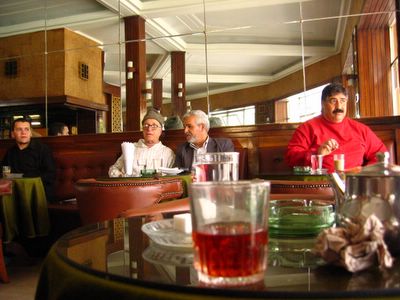
The Moroccan Woody Allen (second to the left.) He is saying, "Eternal nothingness is fine if you happen to be dressed for it." He is often heard complaining about the toilets here, veritable holes in the floor with a bucket system of flushing, "Not only is there no God, but try getting a plumber on weekends."
Saturday, May 28, 2005

More about the Jajouka later. Here is one of the oldest and wisest of them all. He has been living in the mountains, playing his own tunes since the beginning of time, and was the first to discover the metal whistle. Native to the "low" peaks of Alaska his name is Alex A, and he is a force to be reckoned with. Do not attempt to make idle conversation, he will play Foggy Dew in your inner ear. Do not let him lock you in a stare, as I have let my camera do here, your heart will jump like a frog, and your hair will stick out in fanning crown like an electric shock wave of syncopation.
To explain a little more about the Jajouka, seriously, the music is at least 500 years old. Many songs have a story behind them--no words, but a context that is inseparable from the tune once you know it. That is why the music is known as Folklore Jajouka. The songs are often played at weddings. One song is played loudly between the bride's house and the grooms to let the groom know when the bride is getting ready and at what stage she is. Another song accompany's the groom from his house when he comes to pay his respects to the family. Another accompanies the bride on horseback. When she arrives, the tune noticeably lightens and becomes celebratory. Yet, the ceremony is not finished. A sad song helps the bride cry (obligatory) for the loss of her family and childhood home, and vow that she will return and never forget her time there.
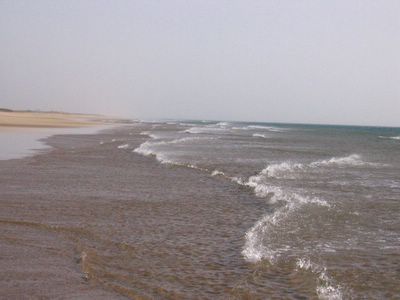
On Tuesday the Sharki hit. A vile East wind spreading sand particles and unease amongst the inhabitants of Tangier. This wind is strong enough to carry a Norton Anthology off the table. Everyone gets into a sour mood because of the heated desert brought on its wings. Instead of succumbing to its legend, we went swimming. The Atlantic was acting bizarre, even it was effected. The waves were going out to sea instead of coming in, as if even they were fleeing the Sharki.
Tuesday, May 24, 2005

Bollywood in a lavish theater. It doesn't deserve it. The cinema is amazingly ornate features an impressive waste of space making it extraordinarily luxurious for a movie theater. It was recently restored and all the gold leaf around the screen and on the ceiling was painted over with gold paint. Good one. This theater should really be used for theater pieces and concerts. Watching a movie on the screen is frustrating as the light from the film bounces off and hits all the gold everywhere. The theater is as bright as dusk and no one has any privacy.
Friday, May 20, 2005
May 20//Question from Suz, Who is Sarah?
Who is Sarah, sarah is a wisp of a girl. In fact she's a wisp because she has so much energy she often sublimates herself.
May 19//On a hillside
In this climate, when it gets abnormally cold in the winter, skinny trees, their wood freezes and the resin gets pushed out onto the bark. In the spring all their resin oozes out onto the bark and is most susceptible to the sun. The bark burns and turns black black.
May 18//Trucks for trees
Two women talking under the shade of a truck
ks ks kskssssss, aimed at cats of sorts
coming of windows, such well lit rectangles
and no interruption with sloping forms
that’s not real shade, that sidewalks still hot.
May 17//Bushisms
On the occasion of Algerian liberation the leaders of the independence movement(they were young, 25) there were a number of, what we call "bushisms" uttered.
"The economy was at zero, we're going to multiply it by ten!"
"We were at the edge of a pit and we're taking a step forward!"
I am wary that these are Moroccan jokes and legends about their oh so close neighbor with oil to the east. But I was reassured that the source is reliable, and was actually present at these roaring revolutionary speeches.
May 17//Translation in the air
12:30pm
Muezzin: I attest that mohamed is the prophet of god, God is the biggest (Akhbar), God is the greatest (Akhbar). I attest the God is the greatest. Greet the prayer, greet the accomplishment (of God). God is the greatest. The Muezzin sings this in three different cadences on Fridays. Fayez had to listen to know what he was saying. The story of the Muezzin, the man who sings from the minarets over loud speakers, was started with Bilal, an Abyssinian slave. The legend is that he had a beautiful voice and Mohamed asked him to wake him up in the morning by singing.
May 16//Anniversary of the bombing in casablanca
This date has become a national holiday of sorts. The city and the french and spanish cultural institutes in Tangier set up about 50 desks in the park outside my house and children came and drew pictures. A nice way to deal with ten misled youth trying to (and some also succeeding in) detonating themselves.
Monday, May 16, 2005
May 14//One super goal
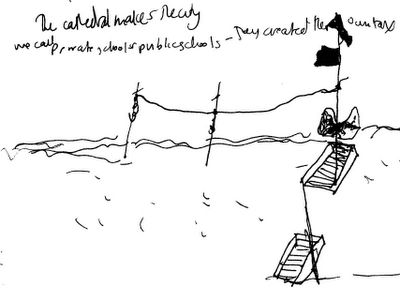
We were looking at this strange contraption erected on the beach. It was a fun guessing game for awhile, but then the question really got to us. Finally Cackles said it was a soccer goal. Of course, it looked just like one. But when we looked around there was not another one in sight. We could see for a long way on one side, and on the other was a cliff, limiting our field of soccer. Maybe they didnt have enough material and instead of splitting up their resources, they took everything they had--VHS tape for a rope marking the upper boundary, wooden rods, styrofoam, plastic sheets for flags, and a former orange crate) and just made one amazing goal.
Then I realized how utopian just that thought was. I was embarassed that this story would enter my head, that I am idealist, naive, a dreamer. But then I noted that the story hadn't entered, all the empirical signs led to the story. Amazing how real stories can be metaphors the second after you tell them.
Then I started continuing the goal in iterations. I can't just lie still on the beach. There's so much to do.





















